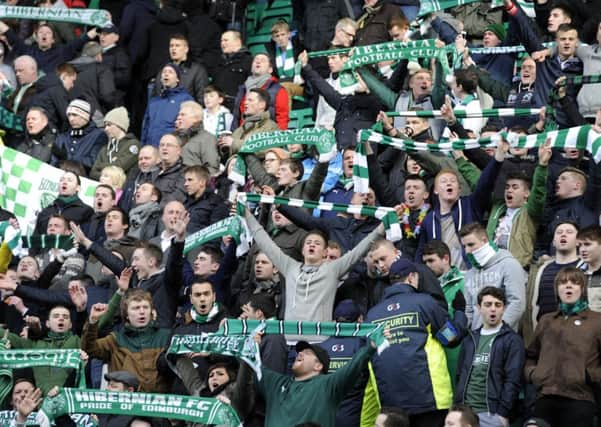Classic match: Hibs v Hearts, New Year’s Day 1940


The derby match between Hibs and Hearts on New Year’s Day 1940 must have been a contender for the most exciting in the history of the fixture. Eleven goals were scored, and the live radio commentary provided by the BBC described all the elements of a thriller, filled with near misses, raking shots, fantastic saves, mazy dribbles and meaty tackles.
The problem was that few spectators among the 14,000 crowd actually saw any of that action, and listeners on the wireless were being fed a commentary which bore no relation to what was actually happening on the pitch.
Advertisement
Hide AdAdvertisement
Hide AdThe bizarre truth was that Easter Road was enveloped in a pea-souper of a fog and nobody inside the ground could see further than ten feet in front of them, so journalist and broadcaster Bob Kingsley simply invented 90 minutes of stunning action.
He had arrived at Hibs’ ground expecting to have a rapid return journey home after the match was called off. Had this been a normal, peacetime fixture, that would certainly have been the outcome. However, this was wartime and normal rules did not apply. The match commentary was scheduled to be broadcast to British forces serving abroad and the War Office ruled that a postponement could alert the Germans to bad weather over Leith. This could not happen, since the Forth Railway Bridge and Leith Docks were prime targets for the Luftwaffe.
So the Scottish League East & North Division match had to go ahead and Kingsley was told by Leo Hunter, the BBC’s head of outside broadcasts, not to mention the fog.
His initial problem was that the only two players he could see were Hibs’ outside-right John Gilmartin and Hearts’ left winger John Donaldson, who themselves could see few of their team-mates.
Resourcefully, Kingsley set up a complex system of runners, who brought back information from the touchline to keep him informed of important moments such as goals and corner kicks. Muddled messages, however, foiled this plan, so he simply went into ad lib mode and described a make-believe game full of fantastic action.
He did rely on the roar of the crowd to tell him when a goal had been scored. Although he could never be sure which team had found the net, he guessed that the louder cheers signified a goal for Hibs, being the home team – but he sent a runner to find out, just in case.
Having gone into full flow in his imaginary report, Kingsley later admitted to a tinge of disappointment on realising that the actual game was turning out to be just as exciting.
In reality, Donaldson gave Hearts the lead in 13 minutes, only for John Cuthbertson to equalise two minutes later. Willie Finnegan made it 2-1 to the home side in 20 minutes, before Donaldson claimed his second to level the scores once more.
Advertisement
Hide AdAdvertisement
Hide AdAfter Bobby Nutley had put Hibs 3-2 ahead, a spectator invaded the pitch, perhaps determined to get close enough to the action to actually see what was happening, and he was removed by referee Peter Craigmyle, who promptly blew the half-time whistle.
Whether the incident had flustered him or the fog was taking its toll, the official quickly realised that he had blown two minutes early, so the players, who had started to leave the field, were called back so that the game could restart. Ironically, Hearts scored twice in those remaining two minutes through Jimmy Briscoe and George Gilmour and led 4-3 when half-time was correctly called.
Understandably, no newspaper was able to describe the goals, although The Scotsman’s brief report the following morning advised that Hibs would have deserved to lead at the interval due to their “clever play” and “better teamwork”, while Hearts’ individual strength gave them the upper hand in the second half.
Gilmour duly scored for the visitors soon after the restart, before Cuthbertson scored twice to complete his hat-trick and restore parity.
Tommy Walker, later to star for Chelsea and Scotland and become the Hearts manager during the most successful period in the club’s history, scored the winning goal in the last minute.
With darkness adding to the fog, some supporters had begun to drift away some time before the final, although many remained ten minutes after the final whistle, unaware that the match had concluded.
Commentator Kingsley was similarly ignorant and continued to invent the action for a further 15 minutes.
Meanwhile, some Hearts players emerged from the dressing room to enquire as to the whereabouts of their team-mate, Donaldson, who had not followed them down the tunnel at the end of the match.
Advertisement
Hide AdAdvertisement
Hide AdA search party was despatched, and the winger was found, doggedly patrolling his left flank and vainly calling the names of team-mates who had long since departed, demanding a pass and hoping that the ball would eventually emerge from the gloom.
Years later, Scotsman columnist and football historian Bob Crampsey recalled the bizarre occasion, labelling it as “Fawlty Towers ahead of itself”. Edinburgh playwright Andrew Dallmeyer was so intrigued by Crampsey’s description that he spent two years turning the story into a stage play, Playing a Blinder, which was aired by BBC Radio Four on New Year’s Day, 2002.
Hibs and Hearts fans heading for Easter Road for today’s derby match will hope for a thriller, though it is unlikely they will witness anything so bizarre as the events of 1 January 1940. That was Fantasy Football – more than half a century ahead of its time.
Hibernian: James Kerr; Davie Shaw and Alex Hall; Charles Birse, Robert Kane and William Rice; John Gilmarton, John Cuthbertson, Willie Finnegan, Sammy Kean and Bobby Nutley.
Hearts: David Stevenson; Duncan McClure and Jimmy Blyth; George Robson, Bob Baxter and Tommy Brown; Jimmy Briscoe, Tommy Walker, George Gilmour, Willie Phillips and John Donaldson.
Referee: Peter Craigmyle.
Attendance: 14,000.